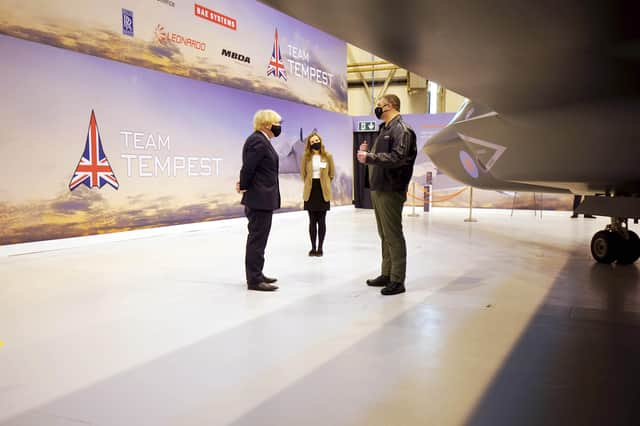Defence review’s nuclear warhead plan risks backfiring: Patrick Mercer


The latest review, however, is different: it promises more money and more capability, an increase in our defences rather than a decrease.
I wonder, though.
Now, it’s too easy to reel off a litany of tanks, aircraft and ships, of boots and battalions, so I won’t do that.
Advertisement
Hide AdAdvertisement
Hide AdRather, I’d like to look at the morality of our leaders’ choices and challenge how well the Government is discharging its first and most solemn duty: the defence of the realm.
The term ‘Cold War’ is emotive but inaccurate, yet every day Britain experiences hostile acts ranging from cyber and electronic attacks to dark intelligence operations.
They are as malign and damaging as anything that happened when we confronted communism and suggest much worse.
It’s obvious that a new style of war is being practised and to bemoan the loss of the hardware and big battalions of the past is shortsighted.
Advertisement
Hide AdAdvertisement
Hide AdSo, the drones and remote fighting vehicles, pilotless aircraft and even the establishment of a space command seem farsighted and sensible, but I have great difficulty with the announcement of an increase of our nuclear warheads by 40 per cent.
Leaving aside Britain’s flouting of the nuclear non-proliferation treaty and international law, this can only cause Iran to rejuvenate its development programme and encourage Russia to build more weapons whilst throwing the delicate credibility of the five permanent members of the UN Security Council into disarray.
The review envisages a novel use for our new nukes, however.
Rather than simply being there to deter enemies with similar weapons – the time-tested theory of mutually assured destruction – they might now be used when a “threat of weapons of mass destruction, such as chemical and biological capabilities, or emerging technologies that could have a comparable impact, makes it necessary”.
Advertisement
Hide AdAdvertisement
Hide AdReally: so we’re now about to invest billions in more obscene legacies from the 60s which have never and must never be used?
Brandishing such weapons at hostile nation states makes some archaic sense, but would we really use them against a Bin Laden type figure who’d got his hands on a dirty bomb?
Surely, the past decades have shown that the fanatical suicide bomber is a fact of war: doesn’t this new stance encourage such tactics on a catastrophic scale?
Morally, how can we justify this?
The review doesn’t just talk about more inter-continental missiles, it promises a new generation of aircraft and ships whilst our withered army will spend much more time abroad.
Advertisement
Hide AdAdvertisement
Hide AdBritain is to increase its ‘strategic reach’ whilst ‘tilting’ our foreign and defence policy towards the Asia-Pacific region because of “China’s increasing influence on its neighbours and beyond”.
No-one can be blind to China’s march towards superpower status.
Her increased defence spending, territorial grabs, international sabre rattling and aggressive use of capital investment is obvious.
Similarly, whatever the truth behind the origins of Covid-19, its low impact on China has allowed her to snatch the reins of commerce in a disease shattered Western world: we are increasingly in hock to communist China’s technology and wealth. Yet, the review insists, “We will continue to pursue a positive economic relationship, including deeper trade links and more Chinese investment in the UK.”
Meanwhile, there’s no such pussyfooting with Russia.
Advertisement
Hide AdAdvertisement
Hide AdThe review effectively labels Mr Putin’s country as a hostile state, an “acute threat to our security... we will actively deter and defend against the full spectrum of threats emanating from Russia”.
Now, I know the hamfisted Salisbury attack was inexcusable and has deeply coloured our thinking, but Russia’s GDP is about half our size and one-eighth of China’s.
But, if threadbare Russia is so dangerous, why has Britain turned away from keeping forces in Europe to counter Moscow and towards the Pacific and our trading partner China?
This smacks of appeasement: we dare not raise our choking voice lest the Chinese Communist Party increases its stranglehold.
Advertisement
Hide AdAdvertisement
Hide AdIt feels as if we’re cosying up to that nice Mr Hitler whilst whining about the minnow General Franco.
Lastly, however ineffective the humble dragoon, stoker and airman are judged to be against their robotic replacements, we need numbers not just for the security of our kingdom but also for floods, dustmen’s strikes, pandemics and a whole litany of unglamorous crisis which beset our daily lives.
On top of this, where’s the morality of reducing military job vacancies when we’re about to enter an armageddon of unemployment?
Patrick Mercer is a former Conservative MP for Newark and Army colonel.
Advertisement
Hide AdAdvertisement
Hide AdSupport The Yorkshire Post and become a subscriber today. Your subscription will help us to continue to bring quality news to the people of Yorkshire. In return, you’ll see fewer ads on site, get free access to our app and receive exclusive members-only offers. Click here to subscribe.
Comment Guidelines
National World encourages reader discussion on our stories. User feedback, insights and back-and-forth exchanges add a rich layer of context to reporting. Please review our Community Guidelines before commenting.